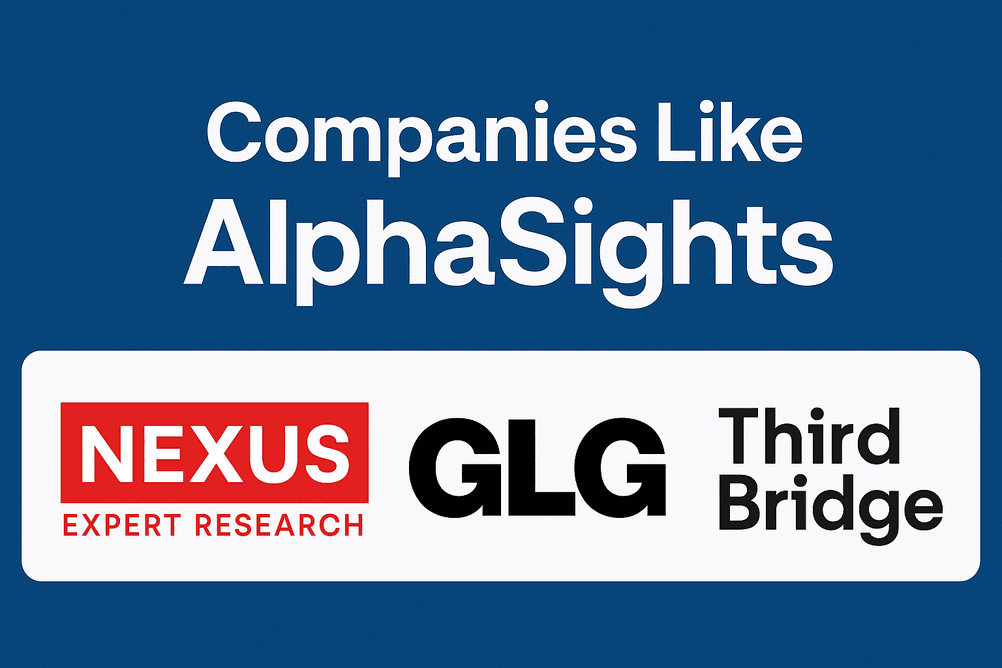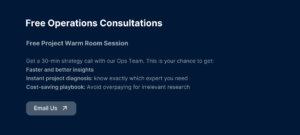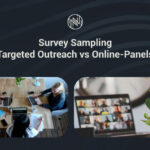
When you are starting to research your competition or the next M&A deal, or even when you just want a sample of respondents, the place to start is always an expert network. If you are one of those people, you need the right network for the job. This short guide lists companies like AlphaSights, what each one actually does best, and which buyer should pick them.
| Platform | Core Strength | Best For | Notable Features |
| Nexus Expert Research | Human-first sourcing & strict compliance | Private equity, tech/startups, healthcare; deals with regulatory/IP risk | Bespoke expert rosters, MNPI-safe, panels & B2B surveys |
| AlphaSights | Fast human matching at scale | Consulting teams, strategy groups needing quick executive input | AlphaGraph-powered matching, moderated calls, transcripts, managed surveys |
| AlphaSense + Tegus | Search-first platform with AI & transcripts | Surveillance, desk research, model training | Massive transcript library, generative AI summaries, investor-grade financial models |
| GLG | Enterprise-scale research delivery | Large firms needing program-level control and long-term research pipelines | Deep compliance, vast roster, large surveys, library access |
| Third Bridge | Analyst-led calls & integrated data feeds | Teams wanting qualitative depth + structured outputs | Analyst synthesis, fast surveys, transcript delivery into workflows |
| Guidepoint | Hybrid: single calls + scoped projects | Healthcare depth, flexible scaling into panels or projects | Qsight product, enterprise compliance, monitoring |
| Inex One | Marketplace aggregation & price discovery | Buyers needing breadth, benchmarking, or niche coverage | Multi-network interface, fast comparison, regional/micro-vertical access |
| NewtonX | AI-driven sourcing & survey scale | Large B2B surveys, broad reach, fast fielding | Knowledge graphs, machine learning sourcing, scalable respondent pools |
Nexus: human-first sourcing and strict compliance
Nexus builds bespoke expert rosters for every project. They do not rely only on a static database. Recruiters find and vet the exact people a brief need. Calls are one-to-one, but Nexus also runs panels and B2B surveys. Compliance is a feature and never an afterthought, so you can rest easy about MNPI checks, employer-exclusion registries, etc. Nexus charges pay-as-you-go, and the user-provided senior per-call band is $650–$900. For more information on the pricing, check out the guide at How Much Does an Expert Network Cost? Use Nexus when a deal has regulatory risk, sensitive IP, or when you must document every step. Nexus is especially good for private equity firms, tech and startups, and healthcare firms, as their internal database is expensive for such experts.
AlphaSights: fast human matching at scale
AlphaSights is built to get you a vetted voice in hours. You send a brief. Their system (backed by AlphaGraph) returns match fast. They offer moderate calls, transcripts, and managed surveys. Their product mixes human sourcing with AI to speed discovery. AlphaSights fits consulting teams, corporate strategy groups, and any buyer who needs quick executive judgment to move a decision forward. Expect subscription or enterprise arrangements; per-call pricing is usually quoted to clients.
AlphaSense (plus Tegus): search-first, library, and AI at scale
AlphaSense is a research platform first. It combines a huge transcript library, AI search, and generative summaries. Tegus (now part of AlphaSense) brings a large investor-facing transcript collection and financial models. Together they let teams query decades of interviews, filings, and reports. If your workflow is about surveillance, desk research, or feeding models with labeled transcripts, this is the tool to buy. AlphaSense reduces the need to schedule calls by letting you extract answers from past interviews and AI summaries. For continuous monitoring or model training, AlphaSense/Tegus is often cheaper and faster than repeated live calls.
GLG: scale, program management, and enterprise delivery
GLG is one of the largest legacy players. It offers a vast roster, firm-wide programs, and managed research services. GLG suits organizations that need program-level control: firm subscriptions, library access, and large surveys. They run deep compliance and can support long-term enterprise research pipelines. GLG is a match when you want a scale and a single vendor to run many projects across teams.
Third Bridge: analyst-led calls and integrated feeds
Third Bridge pairs expert calls with analyst-led interviews and data feeds. They have a library and can deliver transcripts directly into workflows. Third Bridge also offers surveys and panels with a fast turnaround. Their model is strong for teams that want a mix of qualitative interview depth and structured outputs you can plug into models or dashboards. Use Third Bridge when you want analyst synthesis plus expert access.
Guidepoint: hybrid single calls plus scoped projects
Guidepoint positions itself as a hybrid: quick one-to-one calls backed by project services and survey panels. They provide healthcare depth through products like Qsight and run enterprise compliance and monitoring. Guidepoint is useful when you need single calls now and the option to scale into project work or recurring panels without switching vendors.
Inex One: marketplace breadth and price discovery
Inex One aggregates multiple networks behind one interface. It has experts from many suppliers so buyers can compare options and pricing quickly. If you want breadth and test rates across providers, Inex One speeds discovery and benchmarking. It’s useful when you need coverage in unusual regions or micro-verticals and want to compare quotes before committing.
NewtonX and other AI-driven networks
NewtonX blends machine learning with sourcing. They search broadly, build knowledge graphs, and run large B2B surveys. These platforms scale well for large sample surveys or when you need many field respondents quickly. They can be faster and cheaper for volume work, but they trade some bespoke fit compared with human-first sourcing. Choosing AI-driven sellers when reach and scale outweighs the need for deeply tailored candidates.
Picking the right provider
First, decide your output. If you need a one-off expert voice this week, pick a fast-match human network. AlphaSights-style providers and Nexus can deliver that. If you need a searchable archive or model-ready transcripts for repeated queries, buy AlphaSense/Tegus. Their AI and libraries turn calls into reusable data.
Second, judge risk and compliance. If the subject is regulated or high-sensitivity, favor networks that embed audit trails, conflict registers, and custom compliance settings. Nexus, GLG, and Guide point emphasize these controls and will document each step for legal review.
Third, balance cost and frequency. If you run many calls in a quarter, subscriptions or transcript-first platforms reduce effective cost per insight. If you run occasional, high-stakes calls, pay-as-you-go human sourcing gives a higher fit per dollar. Consider hybrid bundles when you need both.
A final practical note (one line)
If your brief combines regulatory complexity and the need for tailored, local voices, start with Nexus for a pilot. If you need continuous surveillance and archive search, try AlphaSense or Tegus. For rapid screening calls in a tight timeline, AlphaSights-style fast-match services will get you across the finish line.









